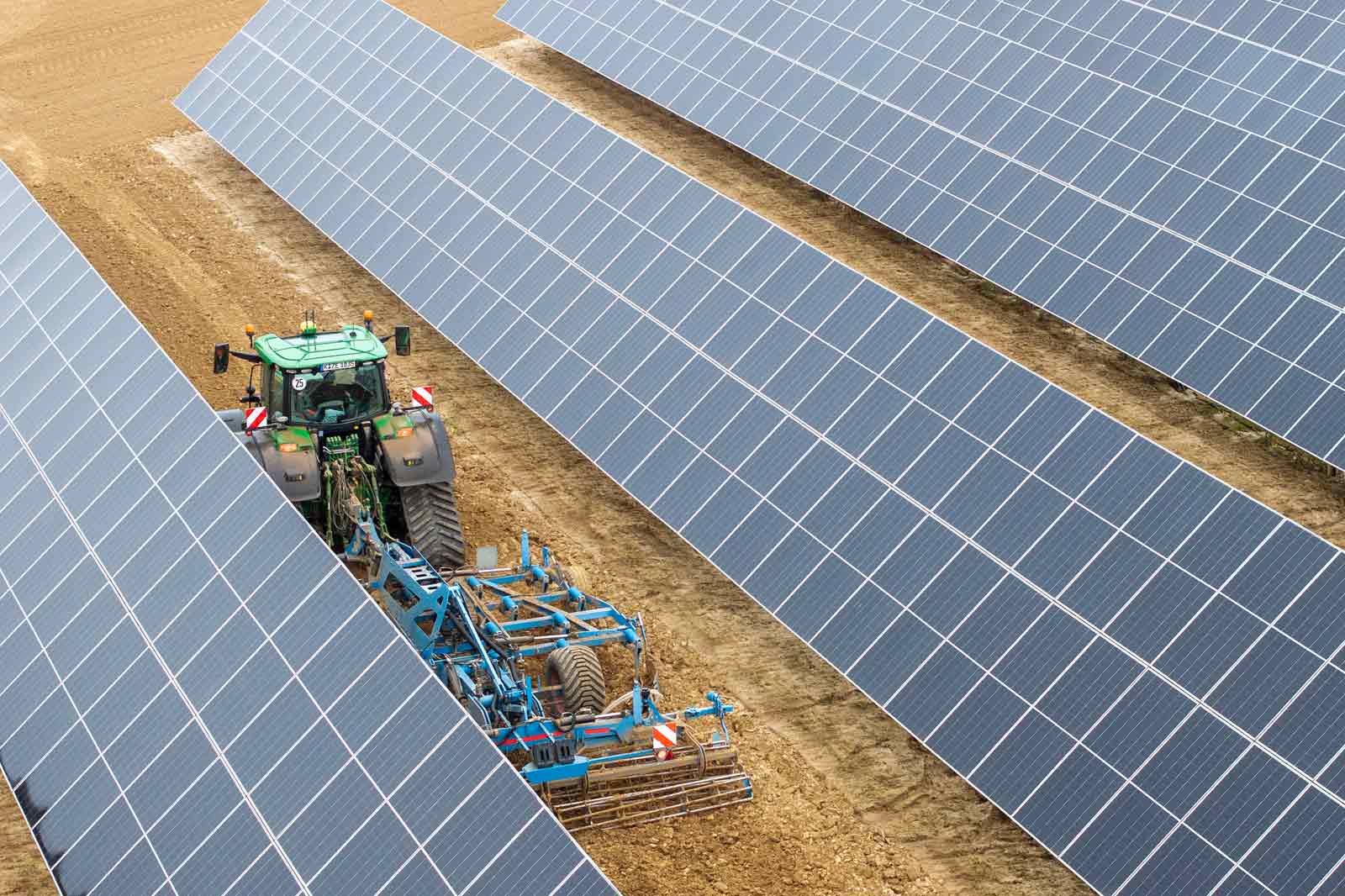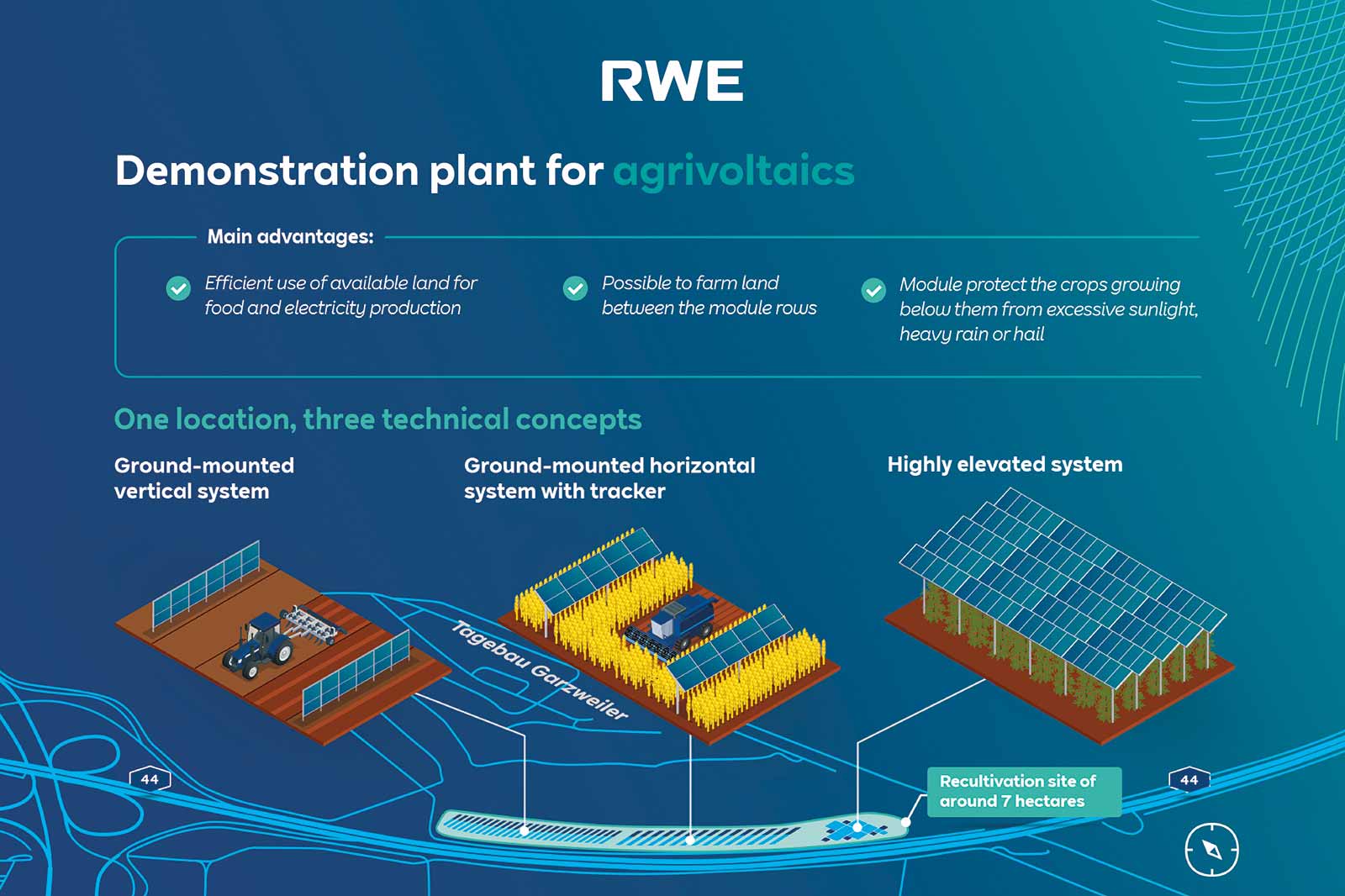Clean power from RWE for UK’s biggest water provider Thames Water
19.12.2025

Producing green electricity and agricultural crops on one field – RWE is testing how these two objectives can be best combined at a demonstration plant (3.2 megawatts peak) for agrivoltaics (Agri-PV) in the Rhenish mining area. In Bedburg, at the edge of the Garzweiler opencast mine, around 6,100 solar modules have been producing green electricity since the start of this year, enough to supply the equivalent of 1,044 German homes. Over the past few weeks, the first seeds have been sown and seedlings have been planted at the site. Today, RWE officially opens the plant in the presence of North Rhine-Westphalia Minister Mona Neubaur and other guests, among them Frank Rock, Rhein-Erft County Commissioner and Sascha Solbach, Mayor of the City of Bedburg.
Mona Neubaur, Minister for Economic Affairs, Industry, Climate Action and Energy of the State of North Rhine-Westphalia: „The massive expansion of renewable energies is a central element of the structural change taking place in the Rhenish mining area and is at the same time indispensable for the energy transition in North Rhine-Westphalia, a secure energy supply and stable prices. Agri-photovoltaics can make an important contribution to this, as it allows scarce land to be utilised twice – for agriculture as well as to generate green electricity which we urgently need. We are supporting this innovative project with €650,000 from the progres.nrw programme for climate protection and the energy transition.“
Katja Wünschel, CEO RWE Renewables Europe & Australia: “Green electricity and green plants are a pragmatic and sustainable combination. Since fertile soil is a precious resource, we must use it in a responsible and efficient manner. The need for large areas of land for further expanding solar electricity generation makes the symbiosis of agriculture and photovoltaics a particularly valuable proposition. In this way, it becomes possible to reap two types of yield from the land at the same time. With our Agri-PV demonstration plant in Bedburg we are providing important applied research, enabling us to utilise the full potential of this technology in the future.”
Double yield from solar power and agricultural crops
At the company’s demonstration plant, RWE is examining the interaction between plant growth and photovoltaics over a period of five years under different seasonal weather conditions. The aim is to develop suitable management methods and economic operating concepts for agrivoltaic systems on the basis of the knowledge gained. Scientific input is being provided on the project by the Institute for Plant Sciences at the Forschungszentrum Jülich and the Fraunhofer Institute for Solar Energy Systems (Fraunhofer ISE). The project is funded by the state of North Rhine-Westphalia via the progres.nrw programme for climate protection and the energy transition.
Frank Rock, Rhein-Erft County Commissioner: “In order to overcome the challenges associated with the structural change in the region, it is essential to make these areas available and utilise them efficiently. With Agri-PV, farmers no longer need to decide either to use their land for a solar farm or for agricultural crops, they can do both on one field. The truly exemplary collaboration of industry, science, and state government has made this demonstration project possible – an innovative and positive approach for developing our Rhenish mining area going forward.”
Sascha Solbach, Mayor of the City of Bedburg: “Making the energy transition visible with concrete projects is hugely important now for the people in the region and for the entire process, and it will ultimately be crucial for the transition to succeed. To tackle this enormous task of delivering rapid structural change in the mining area in such a short space of time, we need innovative ideas, extensive technical expertise, and companies that are not afraid to break new ground. The commissioning of the Agri-PV plant shows that we are in an excellent position in this regard and that motivates all of us to continue with our work on this task for the ages.”
One site, three different Agri-PV concepts
RWE is testing three different technologies on the approximately seven-hectare recultivation site. The first variant by Next2Sun uses a vertical design with the solar modules installed rigidly on the substructure. In the second variant by Schletter the modules are mounted on a movable axis, enabling them to follow the course of the sun from east to west. Between the rows of modules, the agriculturists at the RWE-Schirrhof farm have sown a clover-grass mixture and alfalfa. These are robust crops that loosen the soil with their deep root system and create the right conditions for growing cereals, root crops such as potatoes, and various types of vegetables in the coming years. In the third variant by Zimmermann PV-Stahlbau the PV modules are elevated on a high pergola-like substructure. Below them, a farmer from the region has placed raspberries in pots. This type of cultivation has several benefits including healthy plant growth with high yields and more predictable harvest times.
Anna Heimsath, Head of Department ‘Analysis Modules and Power Plants’ at the Fraunhofer Institute for Solar Energy Systems: “Agri-PV systems are as diverse as the agriculture with which they form a system. With the three system variants in Bedburg we are collecting and analysing a large amount of data to enable us to understand if and how the agricultural use of the site impacts solar electricity generation using the different system designs. The information we collect will also help us to improve simulation techniques for
Agri-PV.”
Prof Ulrich Schurr, Director of the Institute for Plant Sciences at Forschungszentrum Jülich: “The demonstration plant is an important building block for structural change and developing the BioökonomieREVIER model region for sustainable bioeconomy. Here, we test how implementing the energy transition and producing sustainable plant-based raw materials and food crops can go hand in hand.”
Images of the Agri-PV plant as well as a graphic illustration for media use are available from the RWE Media Centre (credit: RWE / photographer: Klaus Görgen).
